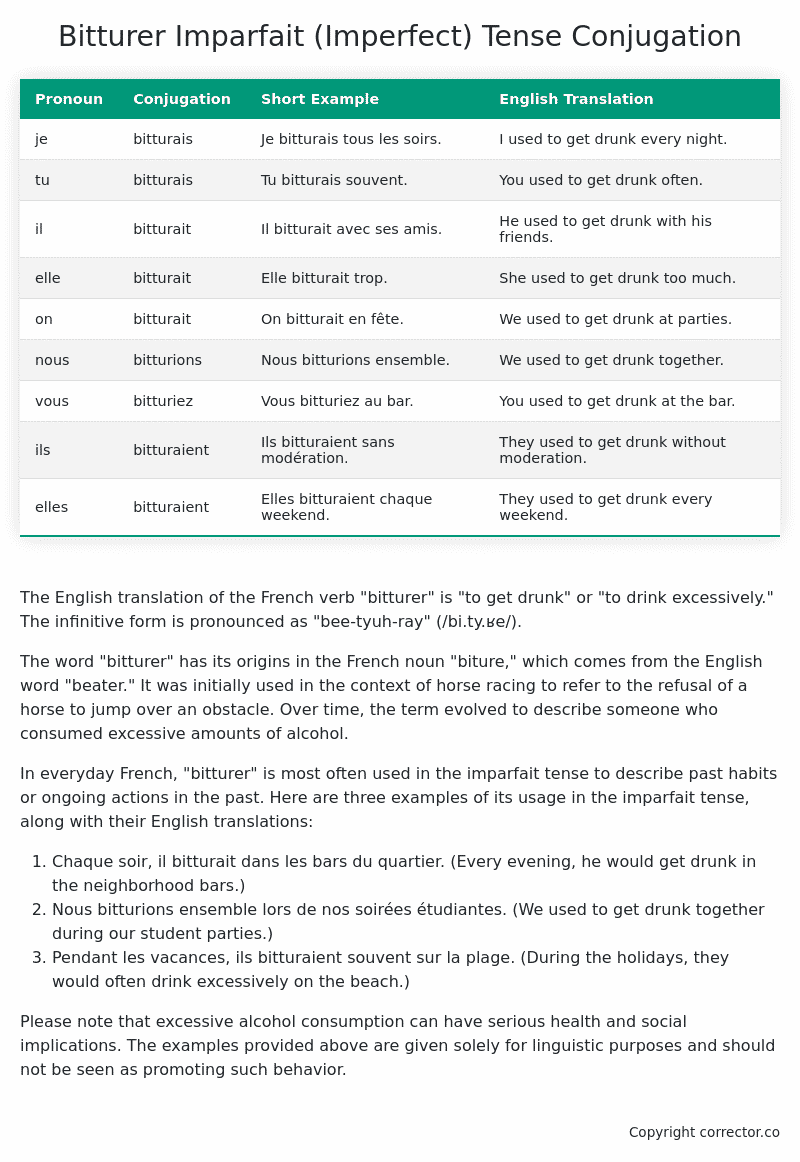Imparfait (Imperfect) Tense Conjugation of the French Verb bitturer
Introduction to the verb bitturer
The English translation of the French verb “bitturer” is “to get drunk” or “to drink excessively.” The infinitive form is pronounced as “bee-tyuh-ray” (/bi.ty.ʁe/).
The word “bitturer” has its origins in the French noun “biture,” which comes from the English word “beater.” It was initially used in the context of horse racing to refer to the refusal of a horse to jump over an obstacle. Over time, the term evolved to describe someone who consumed excessive amounts of alcohol.
In everyday French, “bitturer” is most often used in the imparfait tense to describe past habits or ongoing actions in the past. Here are three examples of its usage in the imparfait tense, along with their English translations:
- Chaque soir, il bitturait dans les bars du quartier. (Every evening, he would get drunk in the neighborhood bars.)
- Nous bitturions ensemble lors de nos soirées étudiantes. (We used to get drunk together during our student parties.)
- Pendant les vacances, ils bitturaient souvent sur la plage. (During the holidays, they would often drink excessively on the beach.)
Please note that excessive alcohol consumption can have serious health and social implications. The examples provided above are given solely for linguistic purposes and should not be seen as promoting such behavior.
Table of the Imparfait (Imperfect) Tense Conjugation of bitturer
| Pronoun | Conjugation | Short Example | English Translation |
|---|---|---|---|
| je | bitturais | Je bitturais tous les soirs. | I used to get drunk every night. |
| tu | bitturais | Tu bitturais souvent. | You used to get drunk often. |
| il | bitturait | Il bitturait avec ses amis. | He used to get drunk with his friends. |
| elle | bitturait | Elle bitturait trop. | She used to get drunk too much. |
| on | bitturait | On bitturait en fête. | We used to get drunk at parties. |
| nous | bitturions | Nous bitturions ensemble. | We used to get drunk together. |
| vous | bitturiez | Vous bitturiez au bar. | You used to get drunk at the bar. |
| ils | bitturaient | Ils bitturaient sans modération. | They used to get drunk without moderation. |
| elles | bitturaient | Elles bitturaient chaque weekend. | They used to get drunk every weekend. |
Other Conjugations for Bitturer.
Le Present (Present Tense) Conjugation of the French Verb bitturer
Imparfait (Imperfect) Tense Conjugation of the French Verb bitturer (You’re reading it right now!)
Passé Simple (Simple Past) Tense Conjugation of the French Verb bitturer
Passé Composé (Present Perfect) Tense Conjugation of the French Verb bitturer
Futur Simple (Simple Future) Tense Conjugation of the French Verb bitturer
Futur Proche (Near Future) Tense Conjugation of the French Verb bitturer
Plus-que-parfait (Pluperfect) Tense Conjugation of the French Verb bitturer
Passé Antérieur (Past Anterior) Tense Conjugation of the French Verb bitturer
Futur Antérieur (Future Anterior) Tense Conjugation of the French Verb bitturer
Subjonctif Présent (Subjunctive Present) Tense Conjugation of the French Verb bitturer
Subjonctif Passé (Subjunctive Past) Tense Conjugation of the French Verb bitturer
Subjonctif Imparfait (Subjunctive Imperfect) Tense Conjugation of the French Verb bitturer
Subjonctif Plus-que-parfait (Subjunctive Pluperfect) Tense Conjugation of the French Verb bitturer
Conditionnel Présent (Conditional Present) Tense Conjugation of the French Verb bitturer
Conditionnel Passé (Conditional Past) Tense Conjugation of the French Verb bitturer
Conditionnel Passé II (Conditional Past II) Tense Conjugation of the French Verb bitturer
L’impératif Présent (Imperative Present) Tense Conjugation of the French Verb bitturer
L’impératif Passé (Imperative Past) Tense Conjugation of the French Verb bitturer
L’infinitif Présent (Infinitive Present) Tense Conjugation of the French Verb bitturer
L’infinitif Passé (Infinitive Past) Tense Conjugation of the French Verb bitturer
Le Participe Présent (Present Participle) Tense Conjugation of the French Verb bitturer
Le Participe Passé (Past Participle) Tense Conjugation of the French Verb bitturer
Struggling with French verbs or the language in general? Why not use our free French Grammar Checker – no registration required!
Get a FREE Download Study Sheet of this Conjugation 🔥
Simply right click the image below, click “save image” and get your free reference for the bitturer imparfait tense conjugation!

Bitturer – About the French Imparfait Tense
NOTE: To take a deep dive into all the French tenses then see our article on Mastering French Tense Conjugation.
Formation of the Imparfait Tense
For regular -er verbs:
For regular -ir verbs
For regular -re verbs
Common Everyday Usage Patterns
Description of Past Habits
Background Information
Mental and Emotional States
It’s employed to express emotions, thoughts, or physical sensations in the past. For example: “J’étais content quand il est arrivé.” (I was happy when he arrived.)
Ongoing Actions
Points to Note About the Imparfait Tense
Passé Composé vs. Imparfait
Conditional
Si Clauses
Narration
I hope you enjoyed this article on the verb bitturer. Still in a learning mood? Check out another TOTALLY random French verb imparfait conjugation!


